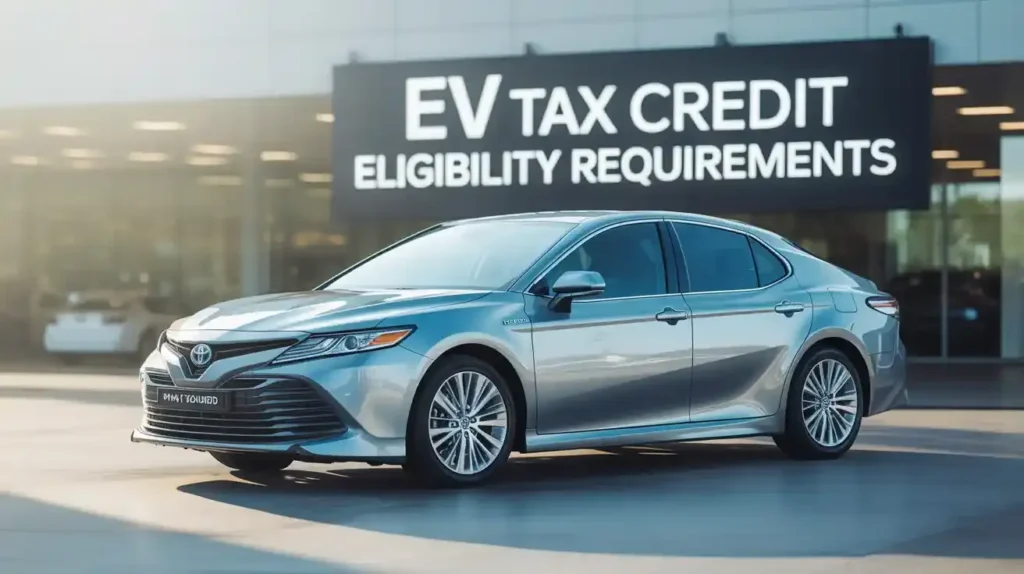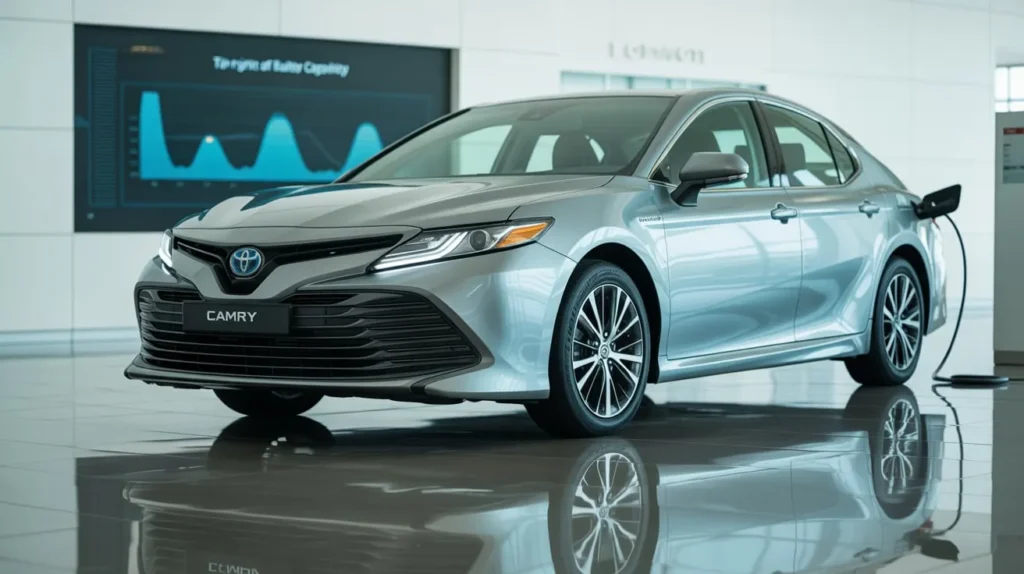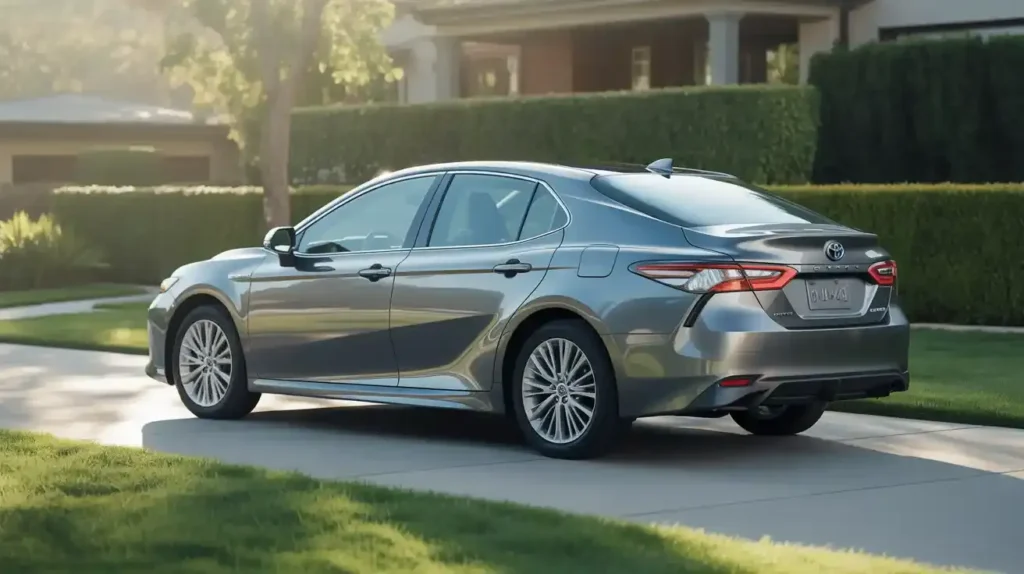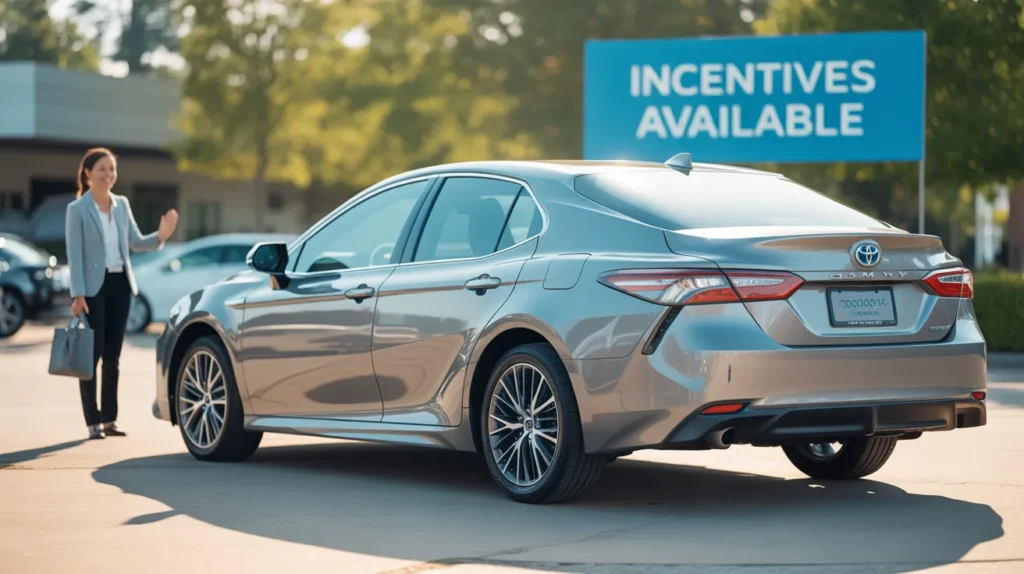No, the Toyota Camry Hybrid does not qualify for a federal tax credit in 2025 because it is not a plug-in hybrid or electric vehicle. Only vehicles with a charging system and a larger battery meet the government’s tax credit rules.
Wondering if your Toyota Camry Hybrid qualifies for a tax break? Find out what counts before you miss out on savings.
What Is the Federal Clean Vehicle Tax Credit in 2025?
The Federal Clean Vehicle Tax Credit is a government program that gives you money back when you buy a car that helps the environment. It’s like a reward for choosing a cleaner vehicle, such as a hybrid or electric car.
In 2025, this credit is meant to lower the cost of eco-friendly cars and support clean energy. But not every car qualifies; you must meet certain rules set by the government to get the benefit.
Why the Toyota Camry Hybrid Is Ineligible for the EV Tax Credit?

The EV tax credit has clear rules set by the IRS. Only certain clean vehicles qualify, mostly plug-in hybrids or fully electric cars with larger batteries and U.S. assembly.
The Toyota Camry Hybrid does not meet these rules. It’s a non-plug-in hybrid, meaning it can’t charge through an electric outlet and runs mainly on gasoline. That alone makes it ineligible.
Main reasons for EV tax credit ineligibility:
- Not a plug-in vehicle (fails plug-in requirement)
- Smaller battery capacity
- May not meet final assembly rules
Also Read: How Many MPG Does the Toyota Camry Get – Fuel Saving Tips!
Key Requirements to Qualify for the Federal Clean Vehicle Credit
Not every buyer or car qualifies for the EV tax credit. To claim it in 2025, both the vehicle and the person buying it must meet certain IRS rules. These conditions help ensure only truly clean and eligible vehicles get the benefit.
Federal clean vehicle credit requirements (2025):
- Vehicle must be brand new
Only new, unused electric or plug-in hybrid vehicles qualify for the credit. - Assembled in North America
The car must be built in the U.S., Canada, or Mexico to meet IRS EV rules. - Meets battery and mineral rules
A certain percentage of battery parts and minerals must come from approved sources. - Price limit applies
For sedans, the MSRP must be under $55,000. SUVs and trucks have a higher capacity. - Buyer must meet income limits.
Single filers must earn less than $150,000; joint filers must earn under $300,000 to qualify. - Purchased in 2025
The credit applies only to vehicles bought and placed in service during the 2025 tax year. - Final IRS approval list
The car must appear on the official IRS-approved list for EV tax credit eligibility in 2025.
Also Read: How Much Is a 2014 Toyota Camry Worth? Get Instant Value!
Is the Toyota Camry Hybrid Assembled in the Required Region?
Yes, the Toyota Camry Hybrid is assembled in the United States, mostly in Kentucky, so it meets the location requirement for the federal EV tax credit. However, it still doesn’t qualify because it’s not a plug-in hybrid and doesn’t meet the IRS rules for battery size, sourcing materials, and other clean vehicle credit requirements set for 2025.
Does the Camry Hybrid Meet the Minimum Battery Capacity Needed?

No, the Toyota Camry Hybrid does not meet the minimum battery capacity required to qualify for the federal EV tax credit. The IRS requires a battery of at least 7 kilowatt-hours (kWh), but the Camry Hybrid typically has a smaller battery, around 1.6 to 2 kWh. This is one of the main reasons it is ineligible.
Quick reason:
Battery capacity is too small (under 7 kWh as required by IRS rules)
Also Read: Do Toyota Camry Hold Their Value – Check Resale Value 2025!
How Recent Policy Changes Affected Hybrid Tax Credit Eligibility
Between 2023 and 2025, the IRS and the federal government updated the EV tax credit rules. These changes introduced stricter conditions, especially for final assembly location, minimum battery capacity, and critical mineral sourcing. They also added income limits for buyers and price caps for eligible vehicles.
As a result, the credit now favors plug-in hybrids and fully electric vehicles, while excluding many standard hybrids. Since the Toyota Camry Hybrid is a non-plug-in model with a small battery and doesn’t meet the sourcing requirements, it no longer qualifies for the federal clean vehicle credit.
Can Leasing a Toyota Camry Hybrid Offer Any Tax Incentives?

When you lease a Toyota Camry Hybrid, the federal tax credit goes to the leasing company, since they are the official owner of the vehicle. However, some lease providers may share part of that benefit by offering lower monthly payments or better lease terms. While you can’t claim the credit directly, you might still enjoy a small indirect savings through the lease.
Is There a Tax Credit for Used Toyota Camry Hybrids in 2025?
In 2025, the federal clean vehicle tax credit will be available only for plug-in hybrids or fully electric vehicles that meet specific battery size requirements. Since the Toyota Camry Hybrid is not a plug-in model, it does not qualify even when purchased used.
No, used Camry Hybrids are not eligible for the tax credit because they don’t meet the plug-in or minimum battery capacity criteria.
Income and Price Limits for Clean Vehicle Credit Eligibility
To qualify for the clean vehicle tax credit, the IRS has set strict limits on both the buyer’s income and the vehicle’s price. Even if a car meets other clean vehicle criteria, it won’t be eligible if these limits are exceeded.
Income limits for 2025:
- Up to $150,000 for single filers
- Up to $300,000 for joint filers
- Up to $225,000 for heads of household
Vehicle price limits (MSRP):
- Up to $55,000 for sedans, hatchbacks, and coupes
- Up to $80,000 for SUVs, trucks, and vans
The Toyota Camry Hybrid’s MSRP usually falls within the sedan limit, but eligibility still depends on other factors like battery size and final assembly location.
Also Read: Are Toyota Camry reliable – Discover Dependable Choices!
Are There State or Regional Incentives for Camry Hybrid Buyers?

Yes, even if the Toyota Camry Hybrid doesn’t qualify for the federal tax credit, some states and local programs still offer benefits for fuel-efficient vehicles. For example, California may provide rebates or HOV lane access, while New York offers tax exemptions for certain hybrids. These incentives can help reduce ownership costs or provide driving perks.
However, programs vary by state, so buyers should check with their local authorities for the most current information.
Other Financial or Ownership Benefits for Camry Hybrid Drivers
Even without a federal tax credit, the Toyota Camry Hybrid offers great long-term savings and ownership benefits. It’s designed to be efficient, reliable, and cost-effective over time, making it a smart choice for many drivers.
Key benefits include:
- Better fuel economy: saves money on gas in the long run
- Lower maintenance costs: fewer repairs than regular gas cars
- Strong resale value: holds value better than many non-hybrids
- Fewer emissions-related fees: in some areas, fewer charges due to lower emissions
These factors make the Camry Hybrid a financially smart option for many car owners.
FAQs:
1. Is a Hybrid the Same as an Electric Vehicle for Tax Purposes?
No, regular hybrids are not treated like EVs. Only plug-in hybrids or fully electric cars qualify for the tax credit.
2. What Factors Disqualify a Hybrid Car from the EV Tax Credit?
If the hybrid isn’t plug-in, has a small battery, or isn’t made in North America, it doesn’t qualify.
3. Does the Camry Hybrid Meet the IRS Plug-In Requirement?
No, the Camry Hybrid is not a plug-in vehicle, so it fails the plug-in rule required for the tax credit.
4. Is the Toyota Camry Hybrid Eligible Under the Used EV Credit Program
No, used Camry Hybrids don’t qualify because the credit only applies to plug-in or electric cars.
5. Can Leasing a Plug-In Hybrid Provide a Tax Credit Benefit?
Yes, but the credit goes to the leasing company—some pass savings to the customer through lower payments.
Conclusion:
The Toyota Camry Hybrid is a smart, fuel-efficient car, but it doesn’t qualify for a federal tax credit in 2025 because it’s not a plug-in hybrid. Still, drivers can save money through fuel savings, lower maintenance, and possible state incentives. Always check current tax rules and local programs to see what benefits might be available for your hybrid.
